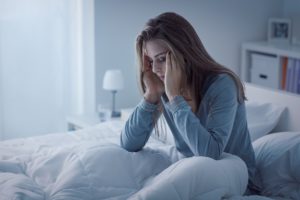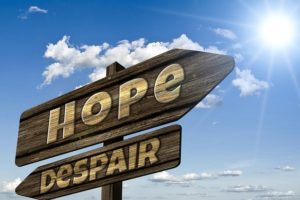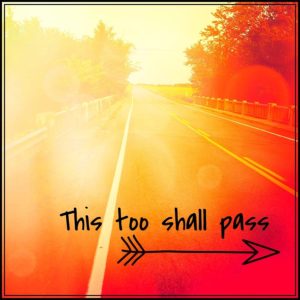Bipolar disorder is a cruel mistress. Now, don’t jump to any conclusions and think I believe other mental illnesses are easier to live with. I don’t feel that way at all. But bipolar disorder can be especially cruel.

Imagine this: Life is wonderful. You’re happy, singing along with the radio, sunglasses on, and driving down the road. You have a smile on your face and just know it’s going to be one of the best days ever. A wonderful day to be alive and experience all that God has created for you. Even though it may be the bleakest of winter days, there’s always something to appreciate. The shape of a particular tree, your dog’s joy at seeing you, the sunlight streaming through clouds. Something. And on this day, everything good and enjoyable is noted. Happy dances are offered up to the heavens in gratitude. Shopping is an enjoyable experience. It doesn’t matter that people keep blocking the aisles and you have to do the WalMart two-step to get around them. Nope. Doesn’t matter. It’s not a huge inconvenience that there aren’t enough check stands open and only mildly irritating when the woman with the screaming kid gets behind you in line. All in all, it could be worse. Chores somehow take care of themselves, it seems. Dinner is almost a masterpiece. Or at least it’s a fully cooked meal. And it’s no problem that sleep is limited. Just don’t feel very sleepy. Yep. Life is indeed wonderful.

Turn the page to the next day. Before you open your eyes, you know you have a problem. The aches and pains are real. Not a figment of your imagination. The fact is, you feel as though you have a bad case of the flu. Your head is foggy. Thinking is such a chore. Bed. Bed is the only place you want to be. If it was the flu, you know you’d have that luxury. But because it’s not, you have to somehow crawl out of bed. There are kids to get off to school. Maybe even a job to go to. Maybe. If you’re one of the “lucky” ones. The day drags by. All you want to do is sleep…stay in your pajamas and sleep. Then you realize you have to leave the house, if you haven’t already. The problem is there’s no energy for a shower. It’s just too much work. Showering. Drying off. Getting dressed. And for those of us females, doing something with our hair. It requires more energy than is stored in the ol’ battery. Dinner. Frozen pizza again, that someone else has to put in the oven? Minimal exchanges with family. Talking is just so difficult. The least little thing sets you off in tears. You find a corner as far away from the family as possible. You feel terrible that you can’t join in, but you may just as easily feel irritated by the noise. Finally you can go to bed. And you wonder if there’s any hope tomorrow will be different.

Bipolar disorder. The best of the best and the worst of the worse. It’s like having each foot firmly planted in a different world. And the worlds ARE different. The hopelessness of major depressive disorder and the jubilation of hypomania or mania. Yes, negatives DO come with the mania/hypomania, but we’ll address those in a different post. For now, let’s look at the black and white of bipolar disorder.
Before I knew my condition had a name, I called my hypomanic periods my “euphoric” times. Truly, that’s what it was like. Everything was tinged with gold and I could accomplish twice as much in half the time and do it better. Then there was a period of “ordinariness” followed by a period of not being able to stay awake and feeling as though I was getting sick. Really! My sinuses and ears would hurt and I’d be achy. And teary. Oh, and I’d want to tear the head off of the hubster for no reason at all. I knew I was being irrational, but couldn’t help it. The anger would be accompanied by sadness…kind of a pity party, in a way.
So I’ve driven both roads plenty of times. I’ll finish part two of my personal journey into crushing depression and awareness of my illness later. Right now, it’s about those roads. You see, I’ve been on them for years. In fact, for the past ten years I’ve been on one road or the other. No periods of ordinariness in between, more’s the pity. Oh, don’t get me wrong, I love the hypomanic states, but I flip flop more than a politician in an election year!
But there is one benefit to having been on these roads. This, too, shall pass. That’s it. No magic chant or upbeat slogan. Just “This, too, shall pass.”
Let me explain. During hypomania, as long as I’ve been dealing with this I’ve come to expect the eventual let down that occurs. Hypomania cannot be sustained for long periods of time. At least, that’s my experience. Because of that, it’s bittersweet. It’s like when you’re a child and realize that there is an after-Christmas. All the anticipation and build up occurs then, wham! It’s over. You learn to enjoy the season while you can, but there’s always that knowledge that it won’t last forever. With bipolar disorder, there is no “cure”. You have bipolar disorder and what goes up always comes down.

But the other side to the coin is the knowledge that depressed states will also come to an end. I will come out of it. The reprieve may not last long, but it will be there. I used to panic when I’d slide back into the darkness, fearful that my medication was no longer working. I don’t fear that anymore. The question is in the back of my head, but I don’t fret over it. I know even with the best of care I’m going to have downs with the ups. I have bipolar disorder, after all. Yes, it sucks. But the good times are all the sweeter for my knowledge and acceptance. I’ve also learned that if my down periods last very long, I need to see my pdoc (psychiatrist). Something needs to be adjusted. It may be due to seasons, sunlight vs. darkness, or even just becoming accustomed to my medication, but a little change can do wonders.
With “This, too, shall pass” comes patience. Maybe that’s the disorder’s purpose. To teach patience. To give us compassion. The down times are a time to regroup, recharge. Good periods are times to do good. To capitalize on the energy to work magic on the world around us. And I don’t just mean “out there” in the world. I mean with our own families at home. After all, they go on this journey with us.
